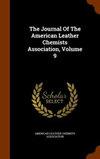制造柔软透明皮革的方法和原理
IF 0.5
4区 工程技术
Q4 CHEMISTRY, APPLIED
Journal of The American Leather Chemists Association
Pub Date : 2023-11-01
DOI:10.34314/jalca.v118i11.8239
引用次数: 0
摘要
为了制备一种同时具有透光性和柔软性的新型皮革,使用甘油处理了经脱脂和漂白的分切毛皮。测试了柔软度、透光率和机械性能,以评估柔软透明皮革(STL)的性能。傅立叶变换红外光谱(FT-IR)、扫描电子显微镜(SEM)、X射线衍射(XRD)、DSC和TG被用来描述STL的结构特征,揭示STL制造的基本原理。结果表明,基于浸灰毛皮重量的 25% 甘油可同时使皮革柔软和透明。猪皮更适合制作薄而透明的皮革,而牛皮则更适合制作均匀而透明的皮革。甘油通过多点氢键与胶原蛋白结合,这种结合对提高 STL 的热稳定性有轻微的积极作用。在透明处理过程中,STL 的纤维束呈分散趋势,而胶原蛋白的分层结构(包括三螺旋结构)依然存在。这种柔软透明的皮革可以成为皮具设计师的新选择,也可能成为高性能电子皮肤的可选基材。本文章由计算机程序翻译,如有差异,请以英文原文为准。
A Method and Principle of Soft and Transparent Leather Manufacturing
For preparing a new kind of leather with transmittance and softness at the same time, glycerol was used to treat delimed and bleached split pelt. The softness, transmittance and mechanical properties were tested to evaluate the performance of soft and transparent leather (STL). FT-IR, SEM, XRD, DSC and TG were used to character the structure of STL and reveal the basic principle of STL manufacturing. The results showed that 25% glycerol based on limed pelt weight could make leather soft and transparent simultaneously. Pig pelt was more suitable for thin and transparent leather while cattle split was better for uniform and clear leather. Glycerol combined with collagen through multipoint hydrogen bonds, and the combination had slight positive effect on improving STL thermal stability. Fiber bundles of STL trended to disperse and collagen hierarchical structure including triple helix remained during transparent treatment. The soft and transparent leather could be a new choice for leather goods designers and might be a selectable substrate for high-performance electronic skin.
求助全文
通过发布文献求助,成功后即可免费获取论文全文。
去求助
来源期刊

Journal of The American Leather Chemists Association
工程技术-材料科学:纺织
CiteScore
1.30
自引率
33.30%
发文量
29
审稿时长
3 months
期刊介绍:
The Journal of the American Leather Chemists Association publishes manuscripts on all aspects of leather science, engineering, technology, and economics, and will consider related subjects that address concerns of the industry. Examples: hide/skin quality or utilization, leather production methods/equipment, tanning materials/leather chemicals, new and improved leathers, collagen studies, leather by-products, impacts of changes in leather products industries, process efficiency, sustainability, regulatory, safety, environmental, tannery waste management and industry economics.
 求助内容:
求助内容: 应助结果提醒方式:
应助结果提醒方式:


